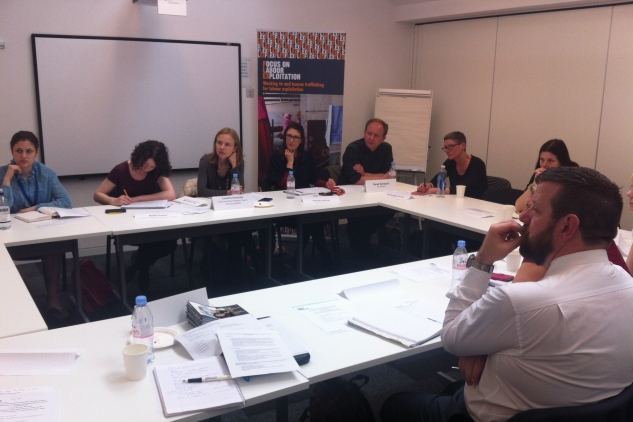
FLEX Labour Exploitation Advisory Group meet with police to discuss identification of labour exploitation in the UK
This week the Labour Exploitation Advisory Group (LEAG) met with police representatives from London and the UK in a focus group to discuss identification of victims of trafficking for labour exploitation. FLEX has been working to engage with the Greater London Assembly and the Mayor’s Office on Policing and Crime to improve policy and practice in London on trafficking for labour exploitation. In particular, this has focused on identification and support of victims at borough level. In this meeting FLEX brought together LEAG members with representatives from the Metropolitan Police Trafficking and Kidnap Unit, as well as from Devon & Cornwall and London boroughs of Westminster, Hounslow, Croydon and Lambeth.
In the focus group police and LEAG members shared their experiences of identifying cases of labour exploitation and highlighted some of the challenges they have faced in supporting victims. Lack of available resources to house and support male victims is a problem that police and LEAG regularly encounter. As a result, many shared stories of victims returning to their exploiters because they have no alternative. There is an urgent need for greater resources to develop services and support networks to meet the needs of male victims, to prevent re-trafficking and further exploitation. Some participants mentioned that the effects of trauma can also be a barrier to accessing services for male victims, as they often do not appear as a typical ‘victim’. It is clear that much more needs to be done to understand and provide for the needs of people who have been exploited for labour as current services tend to be specifically for victims of sexual exploitation.
Participants also identified reluctance to contact the police as a major barrier to reporting and prosecuting cases of exploitation. LEAG members spoke about the strong fear of authorities amongst the people they work with, who are afraid that they will be further victimised, reported to immigration authorities or prosecuted for crimes they were forced to commit by their traffickers. Language barriers are also a problem as migrant workers are often unable to communicate details of their abuse to police officers. They may be put off if they are not recognised immediately as victims of exploitation.
The group also focused on successes and lessons learned in other areas of crime, such as hate crime and domestic abuse. Participants agreed that top-level awareness and the public profile of these areas of crime has been a key driver in prioritising and implementing strategies to tackle them. Increasing awareness among frontline professionals and the public will be vital to ensuring that communities engage with police to identify and prosecute cases of exploitation. Training for police officers on modern slavery has improved significantly, with all new recruits now receiving training on indicators, reporting processes and investigation of cases of modern slavery.
Both the police and LEAG emphasised that in their experience, multi-agency partnerships are highly effective for sharing information and providing support services to meet the needs of victims of trafficking. Members were keen to take opportunities to engage further to enhance the networks of services and advice that police can draw on when dealing with cases. We hope that future partnerships will improve victim engagement with police, by building trust as well as improving services. All agreed that we must offer victims a viable alternative, to enable them to leave their trafficking situations and bring their traffickers to justice.
